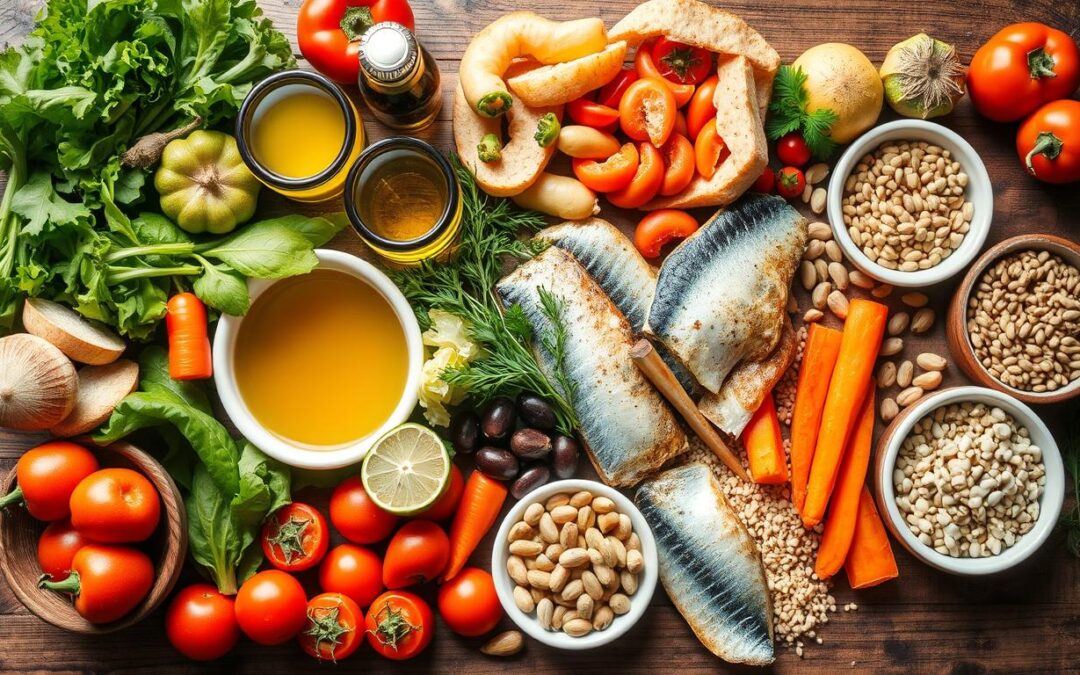Tired of complicated diets that leave you hungry, confused, and reaching for the takeout menu by day three? You’re not alone. The Mediterranean diet offers a refreshing alternative – a way of eating that’s less about restriction and more about enjoying delicious, wholesome foods that happen to be incredibly good for you. This beginner-friendly Mediterranean diet meal plan will guide you through your first week with simple recipes, practical shopping tips, and the science that explains why this eating pattern consistently ranks as the world’s healthiest diet.
What Is the Mediterranean Diet? A Beginner’s Guide
The Mediterranean diet isn’t a “diet” in the traditional sense – there’s no calorie counting, no food groups completely off-limits, and definitely no hunger pangs. Instead, it’s a lifestyle approach to eating based on the traditional foods of countries bordering the Mediterranean Sea like Greece, Italy, and Spain.
What makes this eating pattern special is its focus on whole, minimally processed foods and heart-healthy fats. It emphasizes vegetables, fruits, whole grains, legumes, nuts, seeds, and olive oil, with moderate amounts of fish, poultry, eggs, and dairy, and limited red meat and sweets.
According to a landmark study published in the New England Journal of Medicine, following a Mediterranean diet supplemented with extra-virgin olive oil or nuts significantly reduced the risk of major cardiovascular events among persons at high cardiovascular risk – by approximately 30% compared to those on a low-fat diet.
Science-Backed Benefits of the Mediterranean Diet
Before we dive into meal planning, let’s talk about why this eating pattern has nutritionists, doctors, and researchers so excited. The Mediterranean diet isn’t just delicious – it’s backed by decades of scientific research showing impressive health benefits:
Heart Health Champion
A 2018 study published in JAMA Network Open found that the Mediterranean diet was associated with a 25% lower risk of developing cardiovascular disease over a 12-year period. The diet’s emphasis on olive oil, nuts, and fatty fish provides heart-healthy monounsaturated and omega-3 fats that help reduce inflammation and improve cholesterol levels.
Brain Booster
Research published in Alzheimer’s & Dementia showed that higher adherence to the Mediterranean diet was associated with better cognitive function and lower risk of cognitive impairment. The diet’s antioxidant-rich foods help combat oxidative stress that can damage brain cells.
Weight Management Ally
Despite being moderately high in fat, studies show the Mediterranean diet can help with weight management. A 2020 analysis in The Journal of the American College of Nutrition found that people following a Mediterranean diet lost more weight than those on a low-fat diet and maintained that weight loss for over a year.
Diabetes Defense
According to research in the Annals of Internal Medicine, the Mediterranean diet reduced the risk of type 2 diabetes by 30% compared to a low-fat diet. The diet’s high fiber content and quality fats help regulate blood sugar levels and improve insulin sensitivity.
Getting Started: Mediterranean Diet Basics for Beginners
The beauty of the Mediterranean diet lies in its simplicity. Here’s what to eat more of, what to limit, and what to avoid:
Eat Plenty
- Vegetables (all kinds, the more colorful the better)
- Fruits (fresh and seasonal)
- Whole grains (brown rice, quinoa, oats, whole wheat)
- Legumes (beans, lentils, chickpeas)
- Nuts and seeds (walnuts, almonds, flaxseeds)
- Extra virgin olive oil (your primary fat source)
- Herbs and spices (instead of salt)
Eat Moderately
- Fish and seafood (at least twice weekly)
- Poultry (chicken, turkey)
- Eggs (up to 4 per week)
- Dairy (Greek yogurt, small amounts of cheese)
- Red wine (optional, up to one glass daily)
Limit These
- Red meat (a few times per month)
- Sweets and desserts (save for special occasions)
- Processed foods (anything with a long ingredient list)
- Refined grains (white bread, white pasta)
- Butter and margarine (use olive oil instead)
- Sugary beverages (water is your best friend)
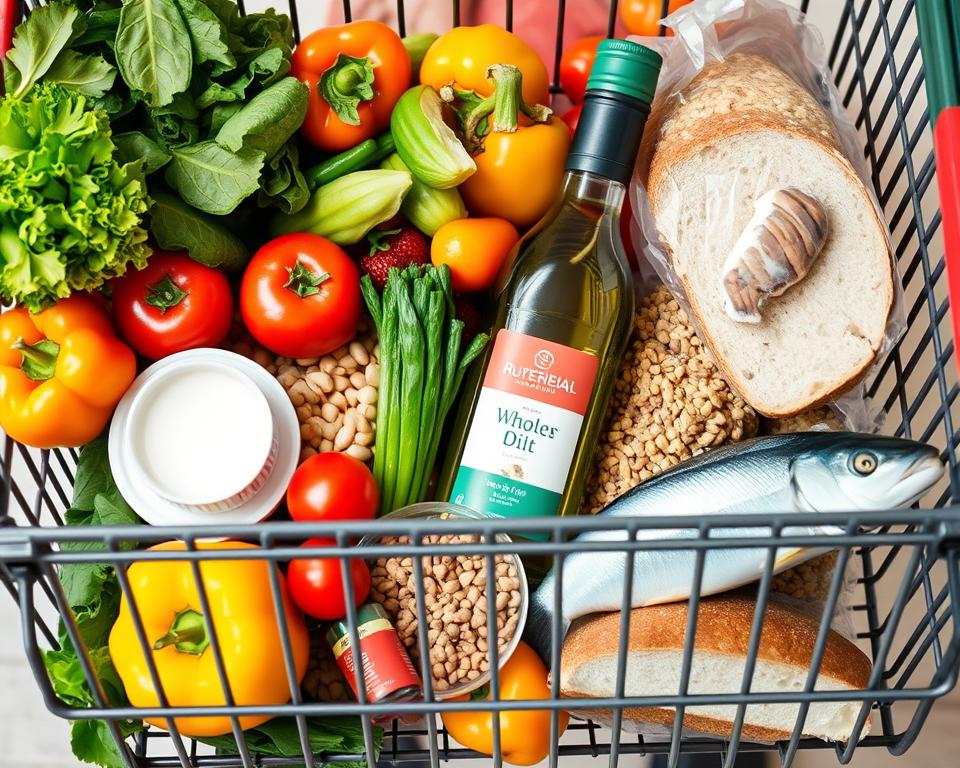
Mediterranean Diet Pantry Essentials
Setting up your kitchen for Mediterranean cooking success starts with stocking the right ingredients. Here’s what to keep on hand:
Oils, Vinegars & Condiments
- Extra virgin olive oil – The cornerstone of Mediterranean cooking
- Balsamic vinegar – For salad dressings and marinades
- Red wine vinegar – Lighter alternative to balsamic
- Tahini – Sesame paste for hummus and dressings
- Olives – Kalamata, green, or mixed varieties
Grains & Legumes
- Brown rice – Versatile whole grain base
- Quinoa – Protein-rich ancient grain
- Whole wheat pasta – For healthier pasta nights
- Farro or barley – Chewy grains for soups and salads
- Chickpeas – For hummus, salads, and stews
- Lentils – Quick-cooking protein source
- White beans – Cannellini or Great Northern
Herbs & Spices
- Dried oregano – Essential Mediterranean herb
- Basil – Fresh or dried
- Rosemary – For roasted vegetables and meats
- Thyme – Versatile herb for many dishes
- Cumin – For Middle Eastern flavors
- Cinnamon – For both sweet and savory dishes
- Garlic powder – When fresh isn’t available
- Red pepper flakes – For a touch of heat
Nuts, Seeds & Dried Fruits
- Walnuts – Brain-healthy omega-3s
- Almonds – For snacking and cooking
- Pine nuts – For pesto and grain dishes
- Sunflower seeds – Affordable nutrient boost
- Dried figs – Natural sweetener
- Raisins – For salads and grain dishes
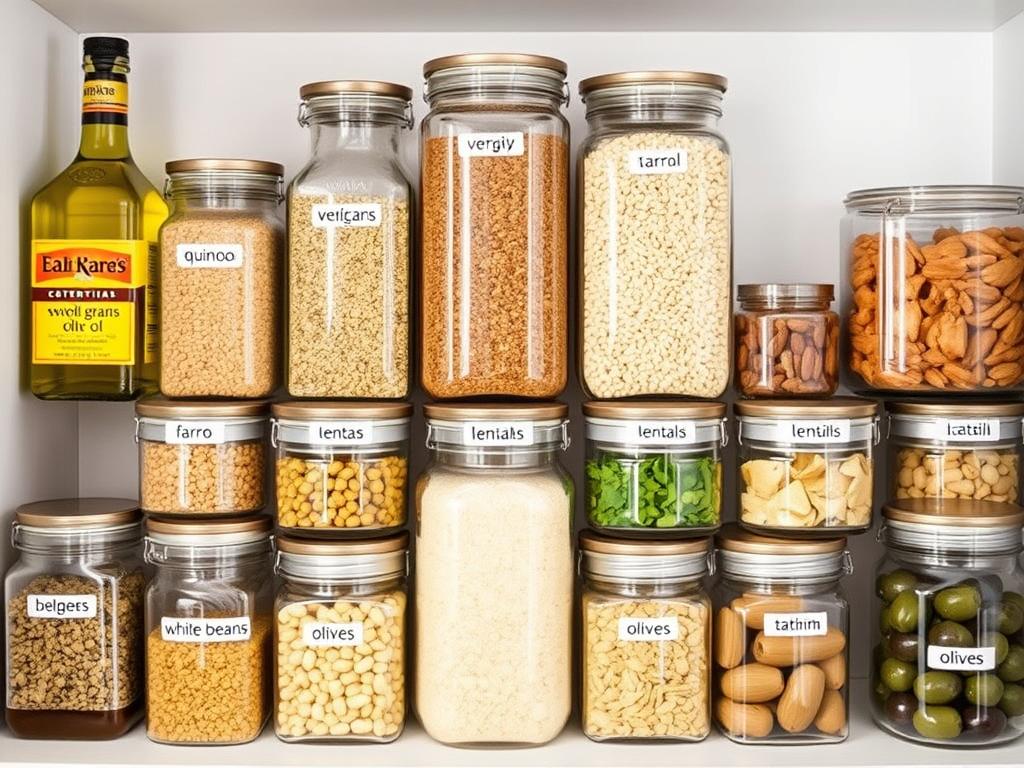
Want to dive deeper into the Mediterranean lifestyle?
Discover more expert tips, detailed food lists, and science-backed benefits that will make your Mediterranean journey even more successful.
7-Day Mediterranean Diet Meal Plan for Beginners
Here’s your easy-to-follow meal plan for your first week on the Mediterranean diet. These recipes are simple, delicious, and perfect for beginners. Feel free to swap ingredients based on what’s available and what you prefer – flexibility is part of what makes this eating pattern so sustainable!
Day 1: Getting Started
Breakfast
Greek Yogurt Parfait: 1 cup Greek yogurt topped with 1/2 cup berries, 1 tablespoon honey, and 2 tablespoons chopped walnuts.
Lunch
Mediterranean Tuna Salad: Mix canned tuna with chopped cucumber, cherry tomatoes, olives, a drizzle of olive oil, and lemon juice. Serve over mixed greens or with whole grain crackers.
Dinner
Simple Baked Salmon: Season salmon fillets with lemon, garlic, and herbs. Bake at 400°F for 12-15 minutes. Serve with roasted asparagus and 1/2 cup cooked quinoa.
Snack
Apple slices with 1 tablespoon almond butter.
Day 2: Exploring Plant Proteins
Breakfast
Avocado Toast: Whole grain toast topped with mashed avocado, a sprinkle of red pepper flakes, and a drizzle of olive oil. Add a poached egg for extra protein.
Lunch
Chickpea Salad: Mix chickpeas with diced cucumber, bell pepper, red onion, feta cheese, olive oil, and lemon juice. Season with oregano and black pepper.
Dinner
Vegetable and Bean Soup: Simmer diced onions, carrots, celery, zucchini, canned tomatoes, and white beans with vegetable broth and Italian herbs. Serve with a slice of whole grain bread drizzled with olive oil.
Snack
A small handful of mixed nuts and dried apricots.
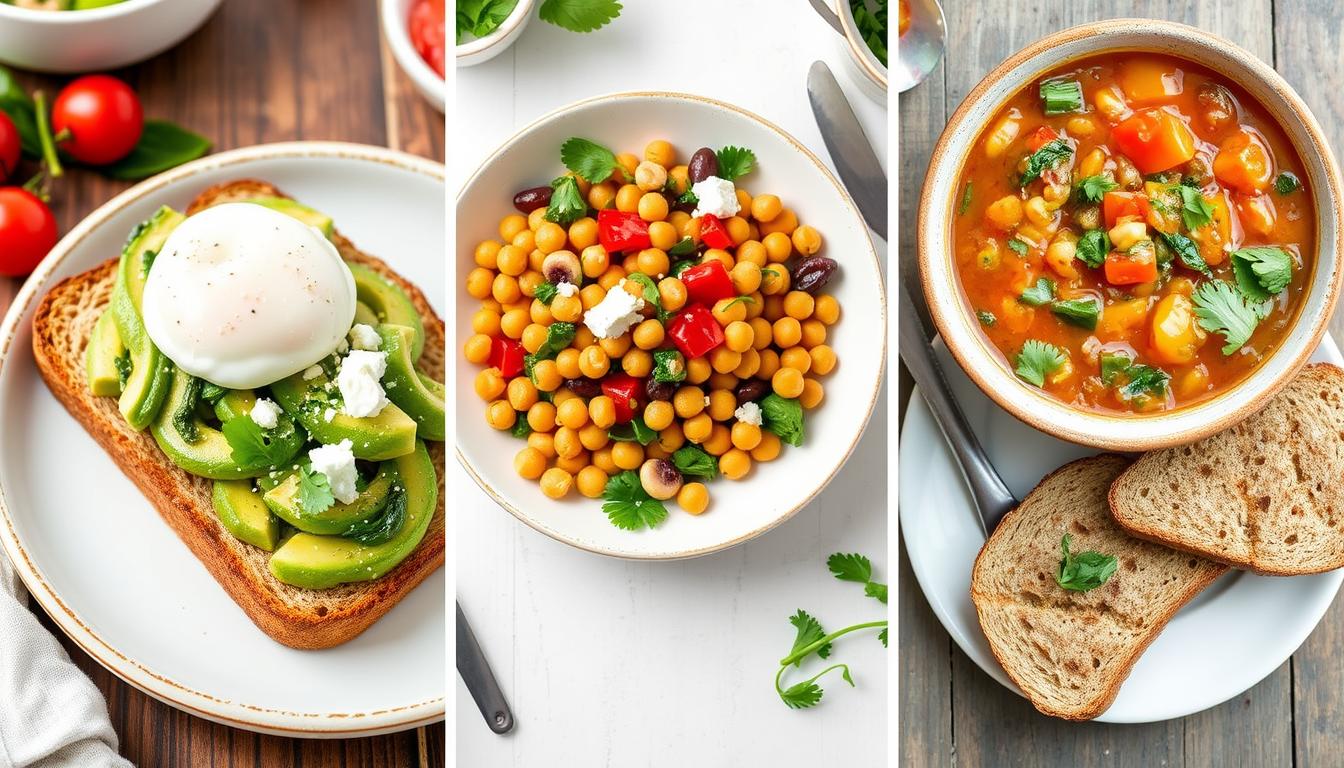
Day 3: Poultry & Whole Grains
Breakfast
Mediterranean Oatmeal: Cook old-fashioned oats with cinnamon and top with sliced banana, a drizzle of honey, and chopped pistachios.
Lunch
Greek Salad Wrap: Whole wheat wrap filled with mixed greens, diced cucumber, tomatoes, olives, feta cheese, and a simple olive oil and lemon dressing.
Dinner
Lemon Herb Chicken: Marinate chicken breasts in lemon juice, olive oil, garlic, and herbs. Grill or bake until cooked through. Serve with a side of roasted vegetables and 1/2 cup cooked farro.
Snack
Hummus with carrot and cucumber sticks.
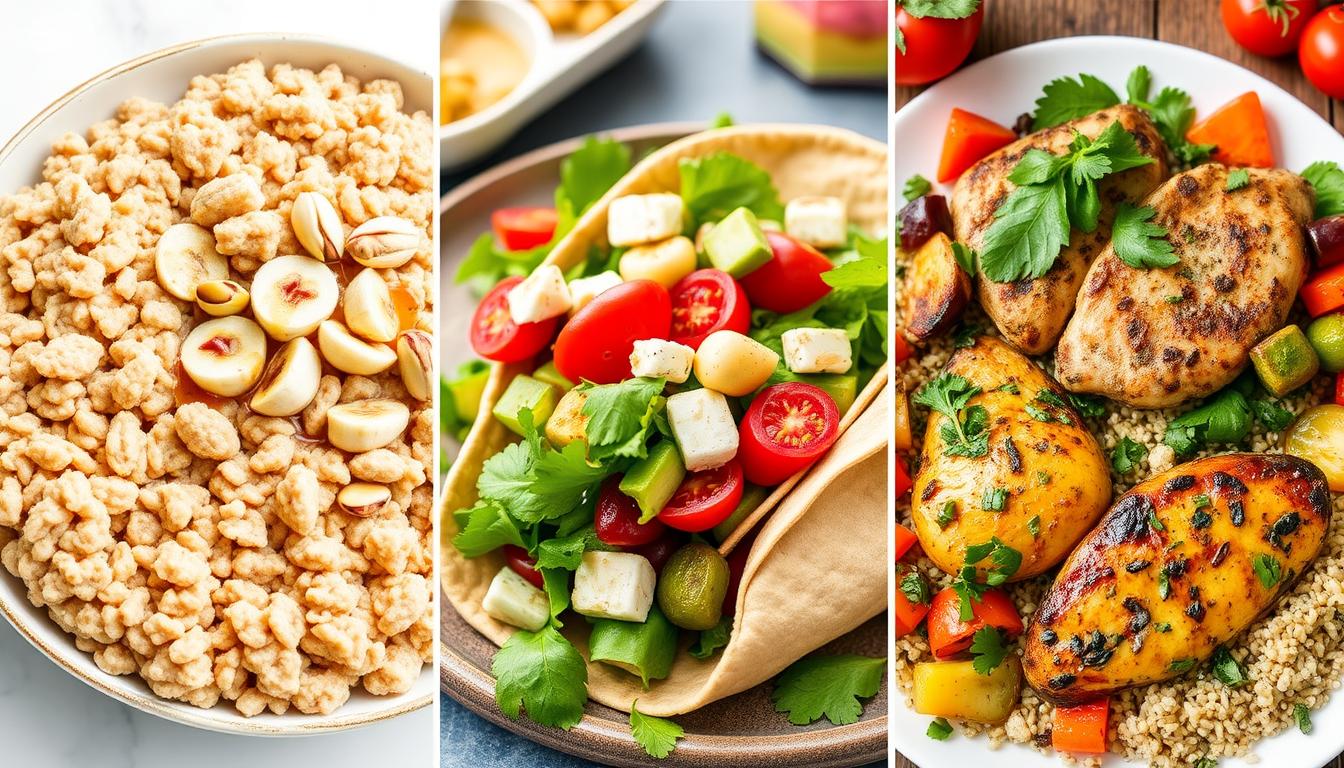
Day 4: Seafood Focus
Breakfast
Vegetable Frittata: Whisk eggs with a splash of milk, pour over sautéed spinach, tomatoes, and onions. Top with a sprinkle of feta cheese and bake until set. Serve with a slice of whole grain toast.
Lunch
Leftover Soup: Enjoy the remaining vegetable and bean soup from Day 2, with an extra drizzle of olive oil and fresh herbs.
Dinner
Garlic Shrimp with Whole Wheat Pasta: Sauté shrimp with garlic, red pepper flakes, and olive oil. Toss with whole wheat pasta, cherry tomatoes, spinach, and a touch of lemon zest.
Snack
Greek yogurt with a drizzle of honey.
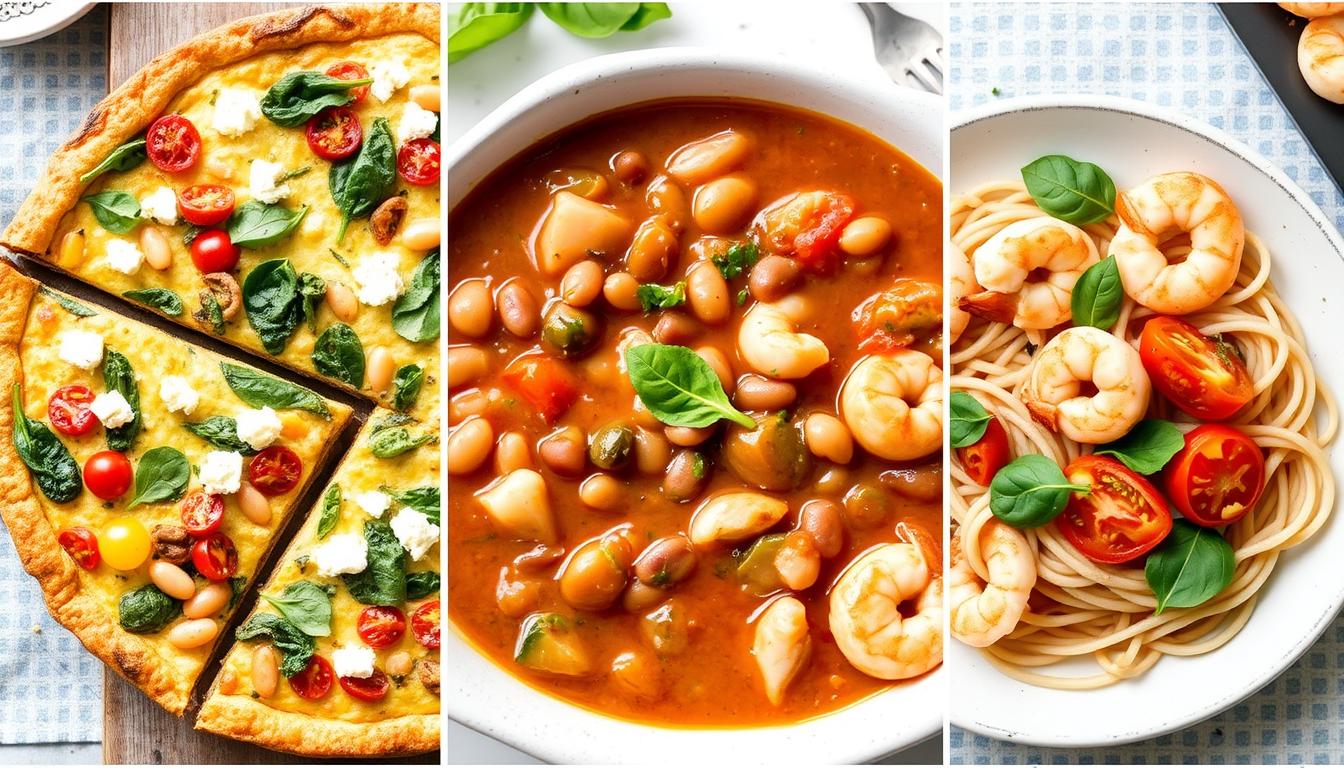
Day 5: Vegetarian Day
Breakfast
Peanut Butter Banana Toast: Whole grain toast topped with 1 tablespoon natural peanut butter and sliced banana. Sprinkle with cinnamon.
Lunch
Mediterranean Quinoa Bowl: Cooked quinoa topped with roasted vegetables, chickpeas, a sprinkle of feta, and a lemon-tahini dressing.
Dinner
Eggplant Parmesan: Baked (not fried) eggplant slices layered with tomato sauce, a light sprinkle of mozzarella, and fresh basil. Serve with a side salad dressed with olive oil and vinegar.
Snack
A small handful of olives and a few whole grain crackers.
Day 6: Fish & Legumes
Breakfast
Mediterranean Breakfast Bowl: Sautéed spinach and cherry tomatoes topped with 2 poached eggs, a sprinkle of za’atar seasoning, and a side of whole grain toast.
Lunch
Lentil Salad: Mix cooked lentils with diced cucumber, cherry tomatoes, red onion, parsley, olive oil, and lemon juice. Season with cumin and black pepper.
Dinner
Mediterranean Fish Stew: Simmer white fish with tomatoes, onions, garlic, bell peppers, and olives in vegetable broth seasoned with herbs. Serve with a small piece of whole grain bread for dipping.
Snack
Sliced bell peppers with 2 tablespoons hummus.
Day 7: Flex Day
Breakfast
Berry Smoothie Bowl: Blend frozen berries, banana, Greek yogurt, and a splash of almond milk. Top with a sprinkle of granola, sliced almonds, and fresh berries.
Lunch
Mediterranean Mezze Plate: Assemble a plate with hummus, tzatziki, olives, whole grain pita triangles, and fresh vegetables for dipping.
Dinner
Grilled Vegetable and Halloumi Skewers: Thread chunks of halloumi cheese, bell peppers, zucchini, and cherry tomatoes onto skewers. Brush with olive oil and herbs, then grill until lightly charred. Serve over cooked bulgur wheat.
Snack
A piece of fresh fruit with a small handful of nuts.
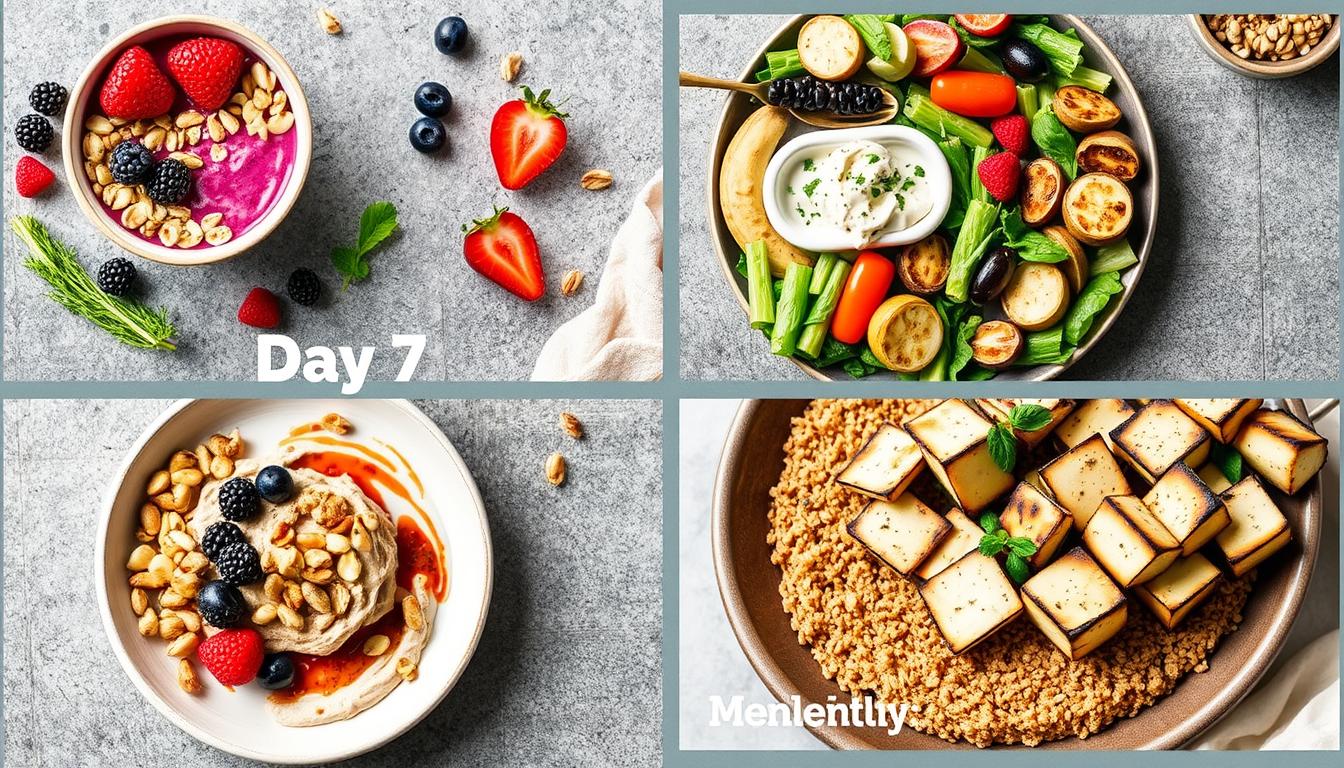
Your Mediterranean Diet Grocery List
Here’s a simple shopping list to help you gather everything you need for your first week on the Mediterranean diet:
Produce
- Mixed greens
- Spinach
- Tomatoes
- Cucumbers
- Bell peppers
- Zucchini
- Eggplant
- Carrots
- Onions and garlic
- Lemons
- Bananas
- Berries (fresh or frozen)
- Apples
- Avocados
Pantry Items
- Extra virgin olive oil
- Balsamic vinegar
- Canned tuna (in water or olive oil)
- Canned chickpeas
- Canned white beans
- Dried lentils
- Whole grain bread
- Whole wheat wraps
- Whole wheat pasta
- Brown rice
- Quinoa
- Farro or bulgur wheat
- Old-fashioned oats
- Nuts (walnuts, almonds)
- Natural nut butter
- Dried herbs and spices
Refrigerated Items
- Greek yogurt (plain)
- Feta cheese
- Small amount of mozzarella
- Halloumi cheese
- Eggs
- Hummus (or ingredients to make it)
- Salmon fillets
- Chicken breasts
- White fish (cod, tilapia, etc.)
- Shrimp
- Olives (Kalamata or mixed)
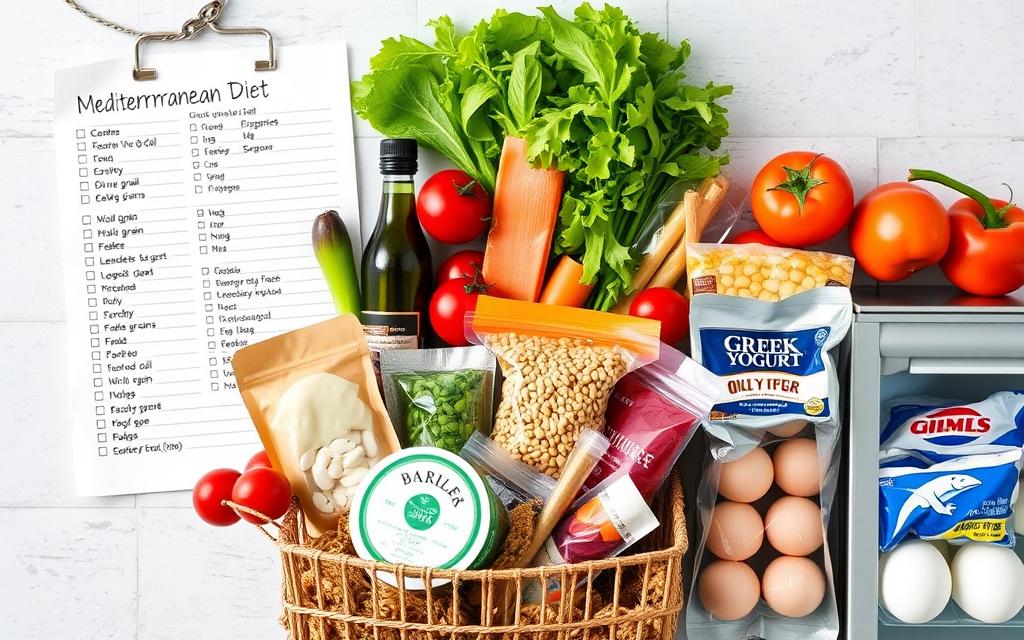
10 Tips for Mediterranean Diet Success
Follow these practical tips to make your transition to the Mediterranean diet smooth and enjoyable:
- Start gradually. Don’t feel pressured to overhaul your entire diet overnight. Begin by making simple swaps like using olive oil instead of butter or adding an extra serving of vegetables to your meals.
- Embrace meal prep. Spend an hour or two on weekends preparing components like roasted vegetables, cooked grains, and homemade hummus to make weekday meals quicker to assemble.
- Make vegetables the star. Aim to fill half your plate with vegetables at lunch and dinner. Try new varieties and cooking methods to keep things interesting.
- Rethink your protein portions. In the Mediterranean diet, animal proteins like meat and fish are often side dishes rather than the main event.
- Snack smartly. Keep Mediterranean-friendly snacks on hand: fresh fruit, small handfuls of nuts, or cut vegetables with hummus.
- Hydrate properly. Water is the beverage of choice in the Mediterranean diet. Try adding slices of citrus or cucumber for flavor.
- Enjoy meals with others. The social aspect of eating is an important part of the Mediterranean lifestyle. When possible, share meals with family or friends.
- Season with herbs and spices. Experiment with fresh and dried herbs to add flavor without extra salt.
- Read labels. When buying packaged foods, choose those with simple, recognizable ingredients.
- Be flexible. The Mediterranean diet is adaptable to different tastes, budgets, and lifestyles. Make it work for you!

Bonus: 15-Minute Mediterranean Comfort Food
When you need something quick, satisfying, and still on-plan, this simple recipe has you covered:
Quick & Creamy Mediterranean Hummus Toast
This elevated toast makes a perfect breakfast, lunch, or snack when you need something substantial in minutes.
Ingredients:
- 2 slices whole grain bread
- 1/4 cup hummus (store-bought or homemade)
- 1/2 avocado, sliced
- 1/4 cup cherry tomatoes, halved
- 2 tablespoons crumbled feta cheese
- 1 tablespoon pine nuts or chopped walnuts
- 1 tablespoon extra virgin olive oil
- Pinch of red pepper flakes
- Fresh herbs (basil, parsley, or dill)
- Squeeze of lemon juice
Instructions:
- Toast the bread until golden and crisp.
- Spread each slice generously with hummus.
- Top with avocado slices and cherry tomatoes.
- Sprinkle with feta cheese and nuts.
- Drizzle with olive oil and add a squeeze of lemon juice.
- Finish with red pepper flakes and fresh herbs.
Nutrition boost: This simple meal provides heart-healthy fats from olive oil, avocado, and nuts, plant protein from hummus, and antioxidants from the vegetables and herbs – all Mediterranean diet staples in one delicious package!
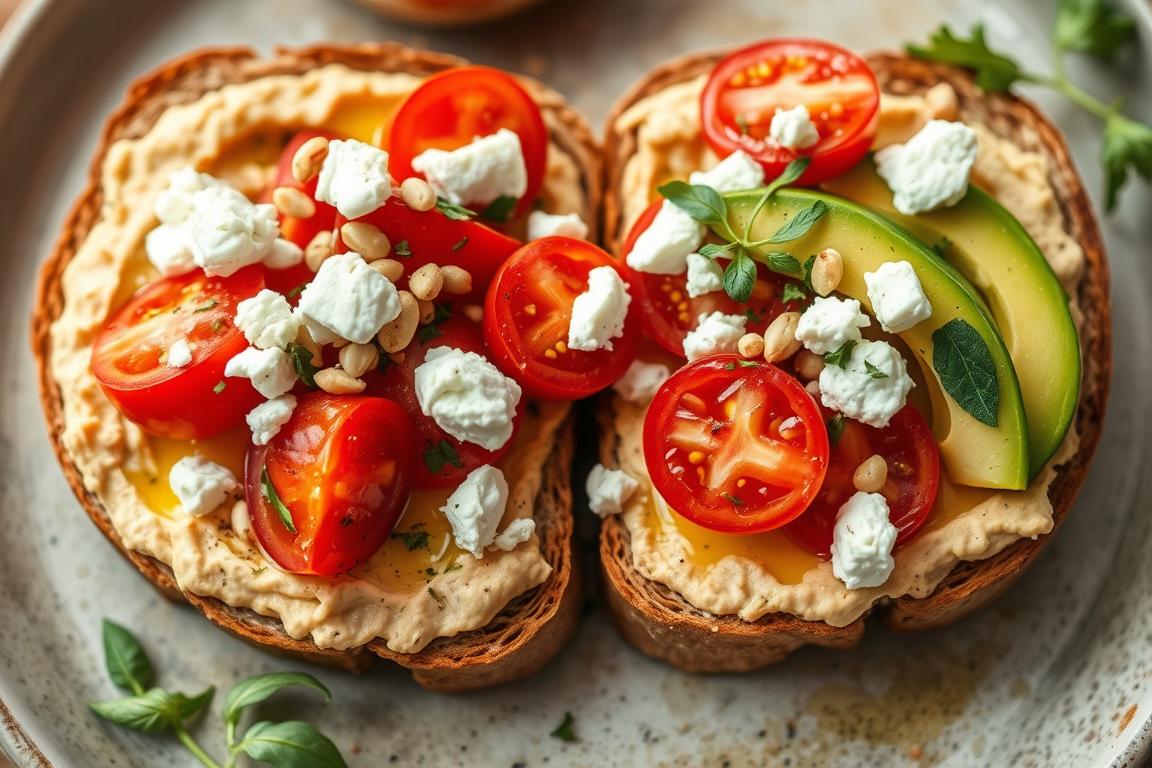
Common Questions About the Mediterranean Diet
Is the Mediterranean diet expensive to follow?
While some Mediterranean staples like olive oil and fresh fish can be pricier, many core components are quite affordable: beans, lentils, seasonal vegetables, and whole grains are all budget-friendly. To save money, buy pantry staples in bulk, choose frozen fruits and vegetables when fresh is expensive, and incorporate more plant proteins instead of meat.
Can I lose weight on the Mediterranean diet?
Yes! Despite being moderate in fat, research shows the Mediterranean diet can be effective for weight loss. A 2019 study published in The Lancet found that participants following a Mediterranean diet lost more weight and maintained that loss better than those on low-fat diets. The diet’s high fiber content helps you feel full longer, while its emphasis on whole foods naturally limits calorie-dense processed foods.
Is bread allowed on the Mediterranean diet?
Yes, bread is part of the Mediterranean diet, but with two important qualifications: choose whole grain varieties when possible, and enjoy it in moderation. In Mediterranean countries, bread is often used to complement meals – for dipping in olive oil or sopping up sauce – rather than as the base of meals.
Do I need to drink wine on the Mediterranean diet?
Absolutely not. While moderate red wine consumption is a traditional part of the Mediterranean lifestyle, it’s completely optional. The health benefits of the diet come primarily from the plant-based foods, healthy fats, and overall pattern of eating – not from alcohol. If you don’t drink alcohol, you can enjoy water, sparkling water with lemon, or herbal tea instead.
Can I follow the Mediterranean diet if I’m vegetarian or vegan?
Definitely! The Mediterranean diet is already plant-forward, making it easily adaptable for vegetarians and vegans. Simply emphasize the abundant plant proteins like beans, lentils, and nuts, and if needed, substitute plant-based yogurts and cheeses for dairy products. Many traditional Mediterranean dishes are naturally vegetarian or can be easily modified.
Start Your Mediterranean Journey Today
The Mediterranean diet isn’t just another eating plan – it’s a delicious, sustainable approach to food that can transform your health while delighting your taste buds. By focusing on fresh, minimally processed foods, heart-healthy fats, and vibrant flavors, you’re not just changing what you eat – you’re embracing a lifestyle that millions of people have enjoyed for generations.
Remember, the key to success is starting gradually and making changes that work for your preferences and lifestyle. Use this beginner’s meal plan as a launching point, then continue to explore the wonderful world of Mediterranean cooking as you become more comfortable with the basics.
Your body – and your taste buds – will thank you!
Ready for more Mediterranean inspiration?
Discover additional recipes, meal plans, and science-backed tips to make your Mediterranean diet journey even more successful.
Get well and stay well,
Ray Baker


